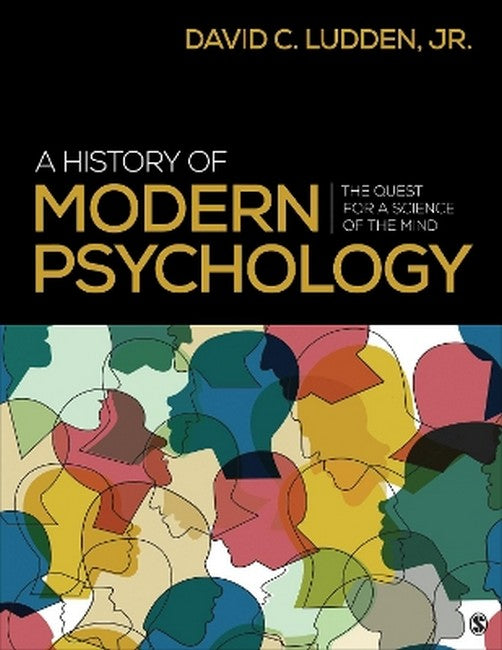David Ludden is professor of psychology at Georgia Gwinnett College near Atlanta. He earned his Ph.D. in Cognitive Psychology at the University of Iowa in 2002. Although a psycholinguist by training, he has also had a secondary interest in the history of psychology from early in his career. His first faculty position after graduation was at a small liberal arts college where he was responsible for teaching half of the psychology curriculum. This experience greatly expanded his appreciation for the enormous diversity of viewpoints within the field of psychology. In 2014, he moved to Georgia Gwinnett College, where his main teaching responsibility is the capstone History and Systems of Psychology course, which thus provided the impetus for writing this book. A History of Modern Psychology is his second book, and it was preceded by The Psychology of Language in 2016, also published by SAGE. David Ludden lives in the greater Atlanta area with his wife and intellectual companion of thirty years, Yawen Ludden, who is a musicologist. She fills his life with great music, wonderful food, and an inimitable joie de vivre.
Request Academic Copy
Please copy the ISBN for submitting review copy form
Description
Preface Acknowledgments About the Author PART I. PRECURSORS TO MODERN PSYCHOLOGY Chapter 1. Philosophical Roots of Psychology Timeline Learning Objectives Looking Back Classical Period Medieval Period Modern Period: Continental Rationalism Modern Period: British Empiricism Looking Ahead Chapter Summary Discussion Questions On the Web Chapter 2. Nineteenth-Century Foundations Timeline Learning Objectives Looking Back Charles Darwin Francis Galton Psychophysics Early Experimental Psychology Looking Ahead Chapter Summary Discussion Questions On the Web PART II. EARLY SCHOOLS OF PSYCHOLOGY Chapter 3. Structuralism Timeline Learning Objectives Looking Back Wilhelm Wundt Wundt's Students Edward Titchener Titchener's Students Looking Ahead Chapter Summary Discussion Questions On the Web Chapter 4. Functionalism Timeline Learning Objectives Looking Back Harvard School Clark School Chicago School Columbia School Looking Ahead Chapter Summary Discussion Questions On the Web Chapter 5. Behaviorism Timeline Learning Objectives Looking Back Methodological Behaviorism Neo-Behaviorism Radical Behaviorism Behaviorism in Transition Looking Ahead Chapter Summary Discussion Questions On the Web Chapter 6. Gestalt Psychology Timeline Learning Objectives Looking Back Forerunners of Gestalt Psychology Berlin School Kurt Lewin and His Students Fritz Heider Looking Ahead Chapter Summary Discussion Questions On the Web Chapter 7. Psychoanalysis Timeline Learning Objectives Looking Back Sigmund Freud First Generation Second Generation Anna Freud Looking Ahead Chapter Summary Discussion Questions On the Web Chapter 8. French Psychology Timeline Learning Objectives Looking Back Hysteria and Hypnosis Alfred Binet Jean Piaget Piaget's Students Looking Ahead Chapter Summary Discussion Questions On the Web Chapter 9. Soviet Psychology Timeline Learning Objectives Looking Back Ivan Pavlov From Pavlov to Vygotsky Lev Vygotsky Alexander Luria Looking Ahead Chapter Summary Discussion Questions On the Web PART III. MODERN DISCIPLINES OF PSYCHOLOGY Chapter 10. Physiological and Comparative Psychology Timeline Learning Objectives Looking Back Brain and Behavior Brain and Mind Nature of Love Ethology: Konrad Lorenz and Nikolaas Tinbergen Looking Ahead Chapter Summary Discussion Questions On the Web Chapter 11. Cognitive Psychology Timeline Learning Objectives Looking Back Early Approaches Cognitive Revolution Ecological and Social Approaches Judgment and Decision Making Looking Ahead Chapter Summary Discussion Questions On the Web Chapter 12. Social Psychology Timeline Learning Objectives Looking Back Social Influence Social Cognition Social Perception Social Relations Looking Ahead Chapter Summary Discussion Questions On the Web Chapter 13. Developmental Psychology Timeline Learning Objectives Looking Back Attachment Social Learning Nature and Nurture Social Development Looking Ahead Chapter Summary Discussion Questions On the Web Chapter 14. Personality Psychology Timeline Learning Objectives Looking Back Trait Approach Dynamic Approach Factor Approach Social Cognitive Approach Looking Ahead Chapter Summary Discussion Questions On the Web Chapter 15. Humanistic Psychology Timeline Learning Objectives Looking Back Carl Rogers Abraham Maslow Human Development Positive Psychology Looking Ahead Chapter Summary Discussion Questions On the Web Chapter 16. Neuroscience Timeline Learning Objectives Looking Back Behavioral Neuroscience Cognitive Neuroscience Affective Neuroscience Neuroscience: The Future or the End of Psychology? Looking Ahead Chapter Summary Discussion Questions On the Web Concept Glossary Person Glossary References Author Index Subject Index
"Ludden's text is a breath of fresh air, enabling students of all backgrounds to see themselves reflected in well-researched and humanized portrayals of the pioneers of the field, working within the context from which psychological science has emerged." -- Cynthia A. Edwards "Clearly written in a friendly tone, this book provides comprehensive coverage of the history of modern psychology, with extended attention to modern perspectives and the history of many core psychological sub-disciplines." -- Kevin M. Clark "Accessible yet still comprehensive, this book brings the history of psychology into the modern day without losing a sense of the perspective of the whole discipline." -- Emily Stark "A very comprehensive book that includes important concepts, movements, and scholars/psychologists. It includes a discussion of diversity issues and has an engaging writing style." -- Matthew Hunsinger "Including sections on women in psychology, minorities in psychology, and psychologists around the world is completely novel (and much needed) in the field. The same can be said for not stopping the history of our field upwards of 50 years prior to modern day-all great aspects that I wish to include in my own course." -- Brian Day

